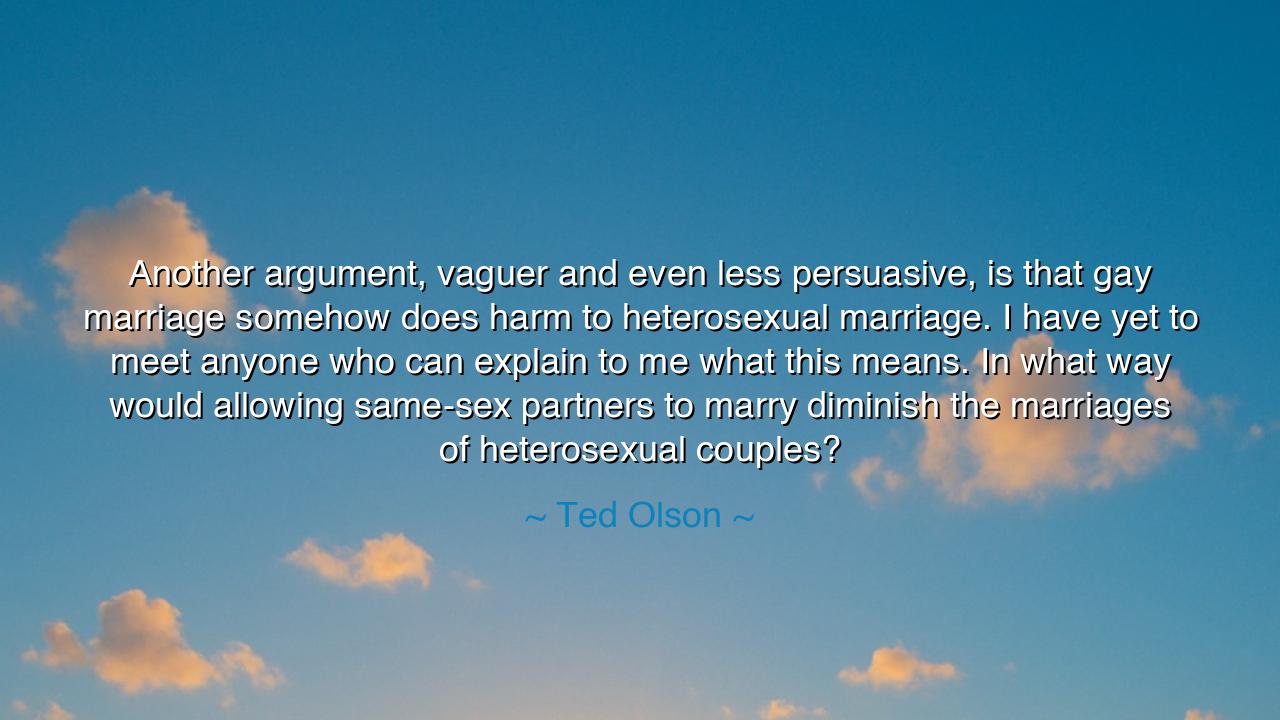
Another argument, vaguer and even less persuasive, is that gay
Another argument, vaguer and even less persuasive, is that gay marriage somehow does harm to heterosexual marriage. I have yet to meet anyone who can explain to me what this means. In what way would allowing same-sex partners to marry diminish the marriages of heterosexual couples?






The words of Ted Olson — “Another argument, vaguer and even less persuasive, is that gay marriage somehow does harm to heterosexual marriage. I have yet to meet anyone who can explain to me what this means. In what way would allowing same-sex partners to marry diminish the marriages of heterosexual couples?” — echo like a voice of clarity through the fog of human prejudice. These words pierce the shadows of fear with the sword of reason and compassion. They are not merely the musings of a lawyer or the defense of a right; they are a moral revelation, a reminder that love, in its purest form, needs no permission, and that justice which excludes is not justice at all.
In ancient times, humanity often mistook its own shadows for truths. Many empires built their strength upon division — between citizen and slave, man and woman, priest and heretic. Yet through the ages, wise souls arose to question these false walls. Ted Olson, a man once known for his conservative bearing, stood among such spirits when he defended the right of same-sex couples to marry in the courts of his nation. It was as if a general from one side of a great war had turned his sword toward the defense of mercy. For he had seen that love is not a weapon but a bridge, not a danger to society but its deepest salvation.
The heart of his question is simple yet profound: how does love between two people threaten another’s union? Can the joy of one diminish the joy of another? Can the light of one candle extinguish another’s flame? The truth, as bright as dawn, is that love shared multiplies; it does not divide. Those who fear the love of others fear not loss, but change — the transformation of old orders, the surrender of supremacy disguised as virtue. Yet all progress begins with such surrender, and all enlightenment begins when fear is faced with reason.
Let us look to history for its testament. In the United States, before 1967, it was forbidden for people of different races to marry in many states. The defenders of that injustice claimed that interracial marriage would “dilute society,” that it would “weaken family values.” But when Loving v. Virginia struck down those cruel laws, did the marriages of others collapse? Did families unravel? No — the world simply grew more honest. Love did not destroy; it revealed the emptiness of hate. And so too with the struggle for marriage equality in our own time. For every union recognized, a new light was lit — not one that blinded the world, but one that helped it see.
Ted Olson’s wisdom reminds us that prejudice often wears the robe of tradition. But tradition, without compassion, becomes a chain around the neck of humanity. To cling to inequality in the name of preservation is to mistake decay for stability. The ancients knew: a river that does not flow becomes a swamp. In the same way, a society that refuses to evolve in its understanding of love will drown in its own stagnation. To honor the freedom to love is to honor the very essence of creation — for love is the force that renews, that binds, that heals.
His question — “In what way would allowing same-sex partners to marry diminish the marriages of heterosexual couples?” — is not just rhetorical; it is prophetic. It calls upon us to examine not others, but ourselves. If the joy of others threatens you, perhaps it is not their joy that weakens your heart, but your own fear that it exposes. The wise must learn that love does not belong to a category, nor truth to a faction. Justice that excludes is a temple built on sand — magnificent, perhaps, but destined to fall when the tide of time arrives.
Therefore, the lesson to future generations is clear: do not fear equality, for it does not take away — it completes. When one group is freed, all are freer; when one is recognized, all are dignified. True marriage — whether between man and woman, woman and woman, or man and man — is not about sameness, but about shared humanity. It is the vow that two souls make to build, to endure, to love against the storm.
So let each of us act with courage. Speak when silence serves injustice. Stand when comfort tempts surrender. Welcome love in all its forms, for in doing so, you fortify the house of humankind. Remember this: the union of hearts harms none, but the refusal to honor it wounds the spirit of all. And when the history of this age is written, may it be said that we chose the path of compassion — that we, too, lit a candle where others once saw only darkness.






AAdministratorAdministrator
Welcome, honored guests. Please leave a comment, we will respond soon